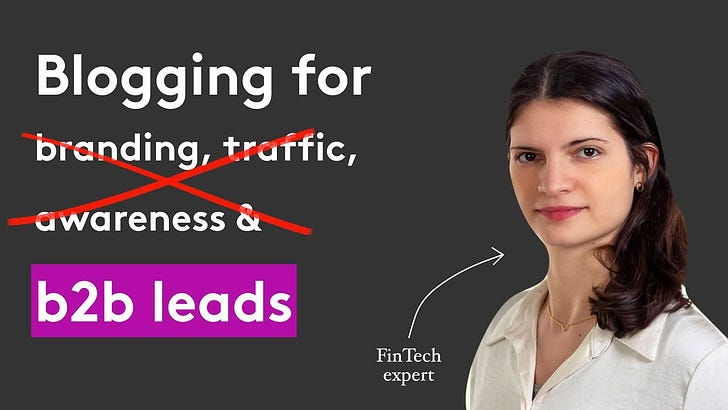Something fun happened since my last post.
Open or close with a conversation?
My last post was about business development and content-based networking.
To write it, I must have been doing searches that got the internet excited about selling me ways to grow my business, and I've been served countless ads, including this one multiple times:
It's about learning a complex funnel system that “attracts and converts high-ticket clients”. What struck me there is that the purpose of the whole system was to lead with a conversational close (below). I've been talking about the opposite: a conversational opener.
Both can work together of course. But, you need to know what type of deal you’re into. If you sell “simple” solutions, but it’s hard to identify the buyer then maybe you need a complex funnel system, like the one above. When it comes to enterprise sales, where you have a clear idea of what institutions can buy your services, but it’s a complex solution, starting with a conversation is a better approach. It’s the opposite of the “traditional” marketing playbook.
Beyond “Content-Based Networking”
My earlier post was about business development and it was inspired by a book called “content-based networking”. Here’s a pretty good one-line summary by ChatGPT.
"Content-Based Networking" by James Carbary teaches how to build meaningful professional relationships by creating and sharing valuable content that fosters authentic connections with key individuals in your industry.
Firstly, it’s worth thinking about sales vs. networking. Although the summary above and the book’s title are about the latter, from memory, the focus is on the former. It’s about finding a balance.
Then I want to mention the elephant in the room: where does it fit in a brand’s content marketing?
And finally, there may be additional, personal, selfish benefits (based on personal experience) that trump profits.
Networking vs Sales
The book says “Invite your ideal buyers”. Why not? But I think there's something a bit problematic about it: keeping a genuine interest (or pretending well enough but that’s even harder).
I'll take a personal example. I've been invited to the “Business Spotlight” podcast. The host was, well, Spotlighting my business.
Approach it cautiously
And he offered some services (coaching starting with a free session!) straight away on the back of it. I wasn't in the market for that. But even if I were, I could see them coming from a mile away. I participated anyway in the podcast. I always say yes if I don’t need to prepare, it’s good practice, but I didn't think this led to a very genuine conversation. There was no incentive to share the episode or recommend it to other people - although I could have.
I’m sure you readers have a more subtle and meaningful approach - but I wanted to offer some caution anyway.
A bigger audience = more value to the relationship
If your show is popular, your business can become popular and that’s content marketing (see below). But even if we miss that completely, it means having a bigger spotlight on your guests, offering more value to the people you will interview. You can’t completely neglect audience growth from a relationship-building point of view.
Networking > Outreach
Secondly, I think this ideal buyer targeting misses a networking opportunity, although the book is called content-based networking, not content-based sales. Being introduced to a connection is probably more useful, more valuable than a serendipitous connection, especially if the introduction is a warm recommendation. If you look at complex deals that benefit from a network-led approach, the various stakeholders and partners can be excellent guests who contribute to your ultimate goal, even if they are not the buyers.
There’s probably an ideal mix of outreach (interviewing prospects) and networking (I’d look at Goldman Sachs and A16Z for guest strategy clues).
Podcasting and content marketing
You’re podcasting. You're creating a lot of content(!). I know what you think if you’re a podcaster… But from a brand perspective, if the primary motivation for your podcast was business development it’s easy to see it separately from the rest of your “content”.
It’s a content engine
Good news! You can still pull them together. Or if you don’t have a content arm, a podcast, a series of conversations can be your content engine.
It's a powerful one and it's also a very efficient one. Let's say you have monthly episodes. You can easily transform each conversation into multiple articles, posts, and clips. They can also help you to create whitepapers, where you regroup the perspectives of different experts. And these can feed your content calendars, week in and week out.
It takes two to converse
It's not just about the guest. It's also about your point of view, and your expertise that you can showcase for the podcast. That’s where the host strategy matters. Your listeners will get a feel for the organization.
That's why I often say that someone at the company should be the host, by default. It can be more than one person, but it should not be the intern who's comfortable in front of the microphone. The host represents the company. Even if just a hundred people listen? Who would you send to an industry conference attended by a hundred people?
And the fact that it's video is not neutral. It's a way to create a connection at scale.
Conversations are more than content collaborations
This draws straight from my experience as a podcaster who recorded hundreds of episodes.
On content collaborations
I think content collaborations are usually a good idea.
It's a good way to break the ice. It works really in terms of audience growth. And you can do it in many ways on social media. There are Instagram takeovers, YouTube collabs, etc. From a more traditional business perspective, you can write an article by sending questions to experts who will be featured in return.
But a conversation is more than that. It is interactive. It has the potential to bring you from point A to point B. You both learn something. It affects your perspective on the world, even if it's not always in a groundbreaking way. That makes it particularly important for relationships.
But there are even more benefits in being able to ignite these conversations.
Other benefits
I evolved my podcast, originally The FinTech Files (about financial technology), into an area of finance that I was even more interested in (investing).
Because this was primarily a personal exploration. In doing so, I transformed a podcast that was bringing in business (as discussed here) into one which isn’t. Because I'm interviewing authors, experts and academics, not brands and my business, Orama, works with brands.
It still amazes me to have this opportunity to reach out to people I admire, my favourite authors, personalities, etc. And most often they will agree to have a conversation with me. The non-monetary benefits are huge.
It’s not a complete financial loss though. It was a time when this exploration of investing was important to me. And it impacted my finances overall by making me a better investor. But you may say it's a selfish perspective, to the benefit of George Aliferis, the individual, and the detriment of Orama, the brand and you probably have a point.
As the sole owner of the business, I’m ok with that… and I'm now thinking of relaunching my FinTech podcast but with a different angle.
So far so good with the September sprints. I started them with a swim training metaphor so here’s another one. Even if you only race long distances it’s beneficial to include sprints in your routine. These solo episodes are not sustainable and I’m here for the conversations, but it’s been a good drill.
So I'll do another one, which may be the last one. And it's related to something that's happening on my YouTube channel as it's about to cross 20, 000 followers even though I've posted almost nothing this year.
It’s an incentive to revisit the missed opportunity for many B2B brands on YouTube.
Thank you for listening, watching, or reading!













